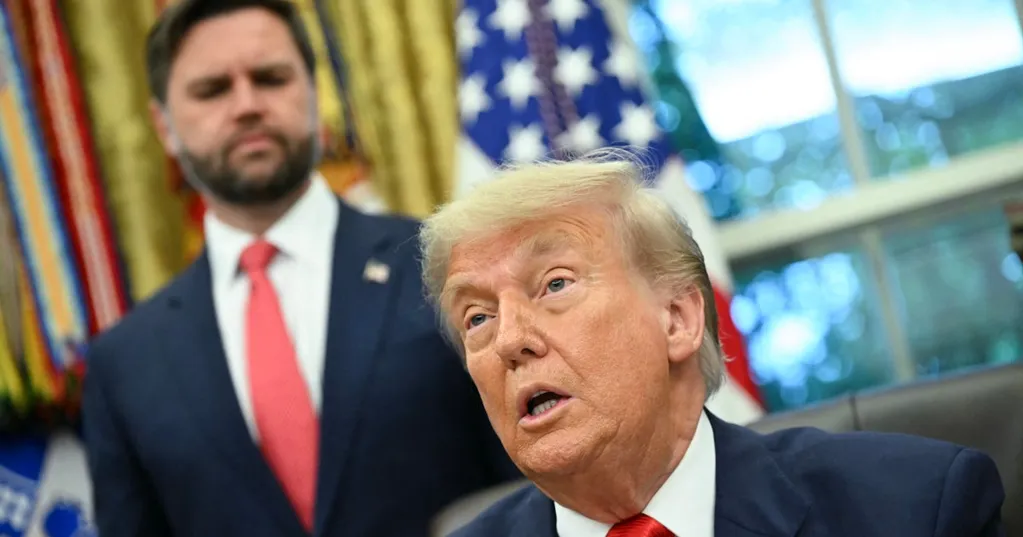By declining to defend the rule, Trump's Federal Trade Commission would ensure employers could continue locking workers in their jobs.
The Federal Trade Commission's historic ban on noncompete agreements could die a quiet death next month if President Donald Trump's new commission appointees choose not to defend it in court.
The ban -- which would bar most firms from requiring workers to sign noncompetes as a condition of employment -- was blocked by a Trump-appointed judge last year after business groups sued. The FTC's new Republican chair, Andrew Ferguson, has until July 10 to tell the court whether the agency will fight for the rule's survival.
The outlook isn't great for the rule's supporters.
When the then-Democratic-led FTC voted 3-2 to issue the regulation last April, Ferguson was one of the two Republican commissioners who opposed it. He later argued in his dissent that the rule was "unlawful," calling it "the most extraordinary assertion of authority in the Commission's history."
Ferguson now heads a 3-member, all-Republican commission after Trump fired its two Democratic members, in what the latter have argued in court was an illegal purge.
"By freeing workers to move from one employer to another in search of higher pay, the FTC estimated that the rule would increase U.S. workers' earnings by more than $400 billion over a decade."
The former commission chair who led the crafting of the rule, progressive antitrust enforcer Lina Khan, said there were "huge economic stakes" in the case. Khan was appointed by former President Joe Biden and stepped down from the commission in January upon Trump's inauguration.
"This was a rule that followed an exhaustive study and assessment of just how noncompetes affect people in their day-to-day lives," Khan said on a recent call hosted by the American Economic Liberties Project, a think tank. "Our team reviewed reams of economic analysis showing how workers are worse off."
"Of course, I'm disappointed that there's a chance it may not go forward," she said.
Both Democrats and Republicans have voiced concern about noncompete agreements in recent years because of how they lock workers into their jobs, preventing them from taking their talents to the highest bidder. Most noncompetes forbid employees from working for a competing firm for a certain amount of time after leaving, ostensibly to protect the employer's investment in training and trade secrets.
Though they were long associated with executives and higher-paid workers like software engineers, the contracts eventually proliferated throughout the economy, even covering some low-wage workers like Jimmy John's sandwich makers.
The FTC rule deems it an illegal "unfair method of competition" for an employer to enter into a noncompete with a worker. The comprehensive ban would nullify pretty much all such agreements where the trade commission has authority, though it allows existing contracts for high-level executives to stay in place until they expire.
By freeing workers to move from one employer to another in search of higher pay, the FTC estimated that the rule would increase U.S. workers' earnings by more than $400 billion over a decade. It also projected the rule would lead to the creation of more than 8,500 new businesses each year, by enabling workers to leave their firms and create new ones without legal threats hanging over their heads.
Polling showed a majority of Americans backed the idea of a noncompete ban.
Employers and the U.S. Chamber of Commerce filed lawsuits against the FTC to stop the rule from being implemented. Although the agency prevailed in federal court in Pennsylvania, a Trump-appointed judge in Texas issued an order blocking the rule nationwide, calling the noncompete ban "arbitrary and capricious." The FTC is supposed to indicate by July 10 how it plans to move forward in that case. (A separate lawsuit originating in Florida is also on appeal.)
The left-leaning group Small Business Majority, which advocates for entrepreneurs, tried to intervene in the case to defend the rule if Ferguson's FTC bails on it. But the group's motion was denied.
"It's really in the FTC's court under the Trump administration to figure out what's going on with this rule," said Alexis D'Amato, the group's government affairs director. "I think our hands are pretty tied for the [time] being."
The FTC said it received 26,000 comments from the public as it was developing the rule, and more than 25,000 of them supported the concept of a ban. Khan said a lot of the stories stuck with her a year later, including a few about people who took jobs across the country, uprooting their families, because noncompetes locked them out of jobs near home.
"The FTC rulemaking is rife with all sorts of scholarly evidence for how it would make our economy better," she said. "But this is also just about people's lives in a very fundamental way, and whether people can lead free, dignified lives."
